Text
Billford Analysis!
Chapter three: Ford and the consequences of betrayal, or a saw-style romcom.
chapter one
chapter two
so, now let's move on to the consequences of betrayal. at first glance, Bill's rage and Ford's suffering carried nothing more than a tsunami of unrestrained emotions, but even here you can find little things indicating changes in Bill's manipulative tactics and their impact on Ford.
James and Bobby's song "I'm your puppet" shows how Ford began to subconsciously see his relationship with Bill as just a blind devotion in which he was a puppet on strings and did everything Cipher said. perhaps in the very last moments before the betrayal, Ford was already questioning his dependence on Bill when the launch of the portal was so close, and this event definitely worried him.
after the betrayal, Ford feels humiliation and horror, but the first one seems to be more. logically, he should be worried about the end of the world, but mentally he is worried that he was so taken advantage of - personal emotions burn much more than spatial worries about the fate of the world.
this resentment hitting the solar plexus is expressed in small things. Ford starts calling Bill by his last name, with a bitterness that feels like a fresh wound after justified doubts.
but despite everything, he calls the drawings of the portal a “gift to humanity,” as if not wanting to deny Bill's contribution and the fact that everything had an exclusively selfish motive. as if not wanting to believe that everything was just a long-term deception.
therefore, even the physical pain of bloody knuckles does not compare with the desire to take revenge and hurt Bill in return.
therefore, during the battle with zombies, Ford hesitates after Bill's speech, not only for the noisy effect of shooting at him, but also because Bill may not be a very talented master of manipulation, but even this works for Ford in the form of pressure on the same fresh and untreated wound of loneliness for many years, and also, it seems, pride, starving to any praise, which stands in place of non-existent low self-esteem.
the skirmish in the form of sticky notes only shows that Ford internally, in moments of weakness, reproaches Bill, as if their quarrel is something familiar and frivolous, which shows his purely emotional hope to return what did not happen - a close, inspiring and sublime friendship-falling in love.
after the snake appears, Ford decides to play Bill's tactics and psychologically torment him in the same way, which is why he runs into one of the examples of Cipher's cruel gestures - he finds himself on the roof of his house, blue from hyperthermia and shivering from the cold.
this gesture, as it was said in his Journal, for Ford shows that he is only Bill's toy and that he remains in his power. despite everything, their relationship changed only in Ford's head to a friendly one on the same level - in reality, Ford remained Bill's follower, his physical and intellectual property.
and the way Bill used Ford's body, recorded a tape for him, scattered polaroid photographs on the floor, created a complete physical environment from their meeting place in dreamscape - tea, chess, music, carried such significance for Ford - nothing will change, but now their mental games have become a reality.
For Ford, all these actions are the real essence of Bill, which has been hidden all this time. every psychological torture, every mockery of his body is his true essence. there is a contradiction in Pines' head that drives him more and more crazy, and recent memories from the past are more painful.
and also, a minor detail - Ford had previously refused to beat the tattoo, that is, to admit that he was Bill's property, so Bill himself marked Ford's body with the tattoo from a crazy night if out of spite getting his toy back. there is obviously a noticeable discrepancy in how the personal perception of their previously progressing relationship proceeded differently.
the last straw was the call to Stanley when Bill's idea failed and was met with hatred, human bright rage, and tearful bitterness on Ford's part.
and this was the last straw for Bill's patience, who tried to threaten Ford with average psychological and physical tortures on the level of a demon. still, so inopportunely, Ford caused too many unnecessary, unfamiliar emotions for Bill, and he snapped.
the physical torture of turning out bones, deleting memories in Ford's head, endless bullying, attempts to put Ford in his place - all this, of course, led Ford into endless horror and pain, which can't be fully discussed.
and here, we need to understand that it is obvious to us as a viewer that Bill broke down and released his raging emotions since he was originally mortal and left this part of himself. however, Ford began at that moment to perceive Bill, as he had the first time, as a divine but tormenting being, like the devil, who torments only because it is how it is created.
in conclusion, we can say that this whole epic after the betrayal crushed any memories and emotions in Ford regarding the fact that Bill was his friend on equal terms, rather than a divine being of knowledge.
bitterness and resentment, however, emotions are not eternal, they have disappeared almost without a trace in thirty years, but at the same time they mutually destroyed something very fragile, delicate and small in an insecure, socially awkward Stanford - the ability to feel romantic or platonic love (choose whatever you like more) to Bill.
#bill cipher#billford#gravity falls#gravity falls analysis#gravityfalls#stanford pines#the book of bill
45 notes
·
View notes
Text
Billford Analysis!
Chapter two: Bill Cipher and his failed plan of taking advantage of Ford's naivety or the path from pawn to something more.
chapter 1
this chapter will be the smallest since there is no direct data on what our triangle felt and thought during this period of time before his plan was revealed. the main source that I dare to refer to are Bill's quotes in Ford's Journals with his personal notes regarding meetings with Bill, which will have to be deciphered from a loving and sometimes too exalted haze to such a chaotic and cruel creature as Bill Cipher.
at first, Bill jokes a lot and is completely not serious about Ford, mixing his condescension with forced lies. maybe his obvious fatigue is reflected here after so many unsuccessful attempts to get humans to build a portal, maybe he initially realized how much Ford is a complex person with low self-esteem and loneliness, which is why he can not try to control his behavior at all.
however, the very first step of a change is that Ford is joking in response. unlike all the other humans Bill tried to deceive and who treated Cipher seriously and cautiously, Ford tries to copy the style of the demon's jokes, which obviously flatters him very much. I even think he was flattered by this little inconspicuous fact more than the blind adoration he had met before.
however, at this stage, Ford for Bill remains something on the level of a non-irritating pet, who is not stupid but naive in his attempts to please. the tattoo, which he asked Ford to fill, serves as an example that Bill sees Ford, first of all, as a thing that has become dear to him only due to its undeniable value in the construction of the portal.
but then, under the influence of the presence of the foolishly genius Ford, who had no distractions to slow down in his work on the portal, Bill begins to allow himself to behave more naturally in his manner - he does not restrain himself from doing terrible things, lifting Ford a gift in the form of an inscription of dead rats. he offered a drink, like to one of his interdimensional criminals-buddies, and, judging by Ford's crooked notes after that fateful night, Bill liked the night, too. at this point, the line between a funny toy and a friend begins to slowly but surely fade.
then, when Bill told about his destroyed dimension, he completely does not restrain himself in the whole dialog - he directly talks about the possibility of eating his twin brother, mentions the Time Baby, although then immediately changes the subject and then does the incredible - shows Ford, only a human he is using for his own gains, the last atoms of his home dimension, what he didn't do with any of his friends from the gang of intergalactic criminals.
one of the reasons why Bill did this, I think, was relaxation and sincerity. Bill is always relaxed and behaves as he wants. that's obvious. however, his gang perceives him above them - they know what kind of monster he can be and what he can do to them for the slightest mistake, which is why they can lie to him for their own good.
and Ford is sincere. he completely trusts Bill, and this trust is felt in the assertiveness in questions, in retaliatory jokes, in excitement and emotionality, which Bill had previously met in humans, mostly only in a negative way.
for a borderline immortal being, blind adoration, sincerity, and human trust as an equal create such a crazy cocktail that the demon of dreams can not refuse it.
and when all this strong whirlwind of emotions and devotion is directed not at Bill, but at Fiddleford, it annoys him if to use very soft words to describe it. insults towards Fiddleford slip through his speech without filters, and not only because Ford may slow down in building the portal, not at all, because Cipher is already confident in him.
Bill at this moment, and also in the case of the Axolotl, is very jealous. he is so jealous that he tells Ford not to trust anyone, naturally implying himself as an exception. the very possibility that Ford can spend his emotions and experiences on other people seems dangerous to Cipher in losing this bubble of security and honesty, where he can be himself and not see constant fear of others.
concluding this short chapter with spatial reasoning, it is difficult to say where Bill drew or whether he even unconsciously drew the line between a close friend and a living toy when he thought about Ford. however, at this point in time, it can be said for sure that Bill was not in love and did not have similar feelings for Ford at all. Bill appreciated their secluded bubble, where everything was fine. he appreciated communication and a perfect plan.
but this value consisted solely in the desire to possess and nothing more. however, this most zealous craving to own the illusion of stability became the basis for the emergence of a strange attachment in the future, or rather, its full realization.
#billford#gravity falls#stanford pines#gravity falls analysis#gravityfalls#bill cipher#the book of bill
46 notes
·
View notes
Text
Billford Analysis!
Chapter one: Ford and his blind adoration before the portal incident, or abusive slowburn.
warning! this is a very open and incoherent form of my thoughts, where I do not mention many canonical details but only consider the attitude of the characters towards them.
so, I want to analyze as clearly as possible the interactions of Stanford Pines and Bill Cipher at different stages of their, I'm not afraid to say, very complex relationship, which bordered on both blind near-religious chthonic adoration and abusive violence as from a typical psychological manual.
to begin with, I want to look specifically at Stanford's notes from his Third Journal in order to create a general portrait of how his idea of Bill has changed over the years (later a retelling of the same events will be presented, but from Bill's point of view). most often, the long periods of their interactions before betrayal and finding out the truth about the portal are ignored, but they are especially important in the context of forming a long-term and strong attachment.
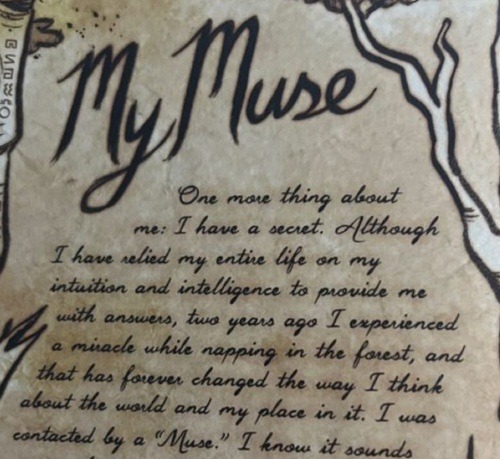
Stanford immediately begins to cherish his new acquaintance with Bill - he calls their meeting a secret that no one can find out. his low self-esteem also flashes here, depending not only on what people he knows say about him but also on society as a whole in the form of a scientific community. he keeps his acquaintance with bill secret out of inner shame and anxiety that he will not be trusted, he will expose the external environment as crazy, and all acquaintance with the supreme being, in the eyes of Stanford, will turn out to be a fiction of a lonely mind.
after all, isolation in a small town led Stanford to label their first meeting as a miracle on the decrepit pages of his diary. it was really a godsend for Bill, such a combination of mental genius and naive emotional trauma, but this will be discussed, again, in the next chapter.
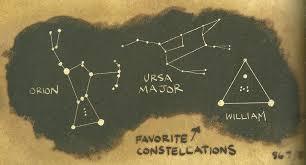
calling Bill his muse, he sees his silhouette in the firmament, drawing the outlines of the constellation “William” in his diary on a par with the constellations we are familiar with. for me, this also means treating Bill not as a separate independent being on the level of Ford himself, no. at this moment, he perceives him more as an idea, as something inspiring, as a path to knowledge that can be read in the web of snow-white stars. he addresses his muse as a higher consciousness, which rarely visits him in dreams, and he listens to his every word. It seems to me that Ford's former religious upbringing also plays a role here, as well as the most persistent belief in the paranormal, which was based only on science fiction stories before moving to gravity falls. Ford's egocentricity, his belief in his own exclusivity, perfectionism combined with arrogance, also play here, which led to the fact that he really, without a doubt, believed that he was chosen as the greatest genius of our time. but really, why not believe if he was so successful in finding and justifying the existence of the supernatural in the first place?
and then - even more. all Ford's pages that relate to Bill at this point in time look fabulous, magical, and unreal. as if torn from a dream, depicting cosmic, unattainable expanses of consciousness and flying chess are symbols of knowledge and business cooperation for him. in such a hazy haze of consciousness, Ford very naively and dangerously agrees to give Bill permission to control his body as he pleases. and for Ford, it makes sense - how can a near-divine being, who does not have his own selfish desires and emotions, do something bad to him? even in the cold flame, when shaking hands, he finds an exquisite and mesmerizing moment.
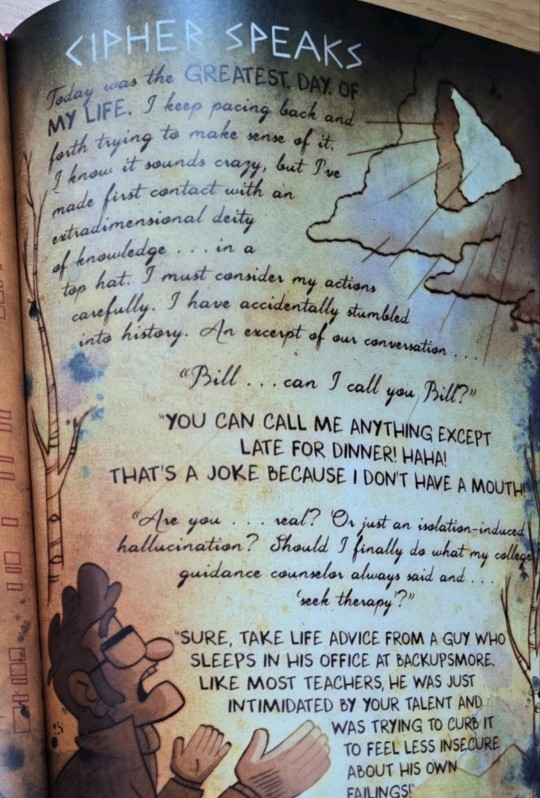
torn pages from Bill's book complement this period in Ford's life - he depicts himself turning to heaven, which also shows his vision of Cipher as an extraterrestrial being that is incomprehensible to his human mind. he treats their relationship as the creation of an important chapter in the whole story, so all his words show excitement - he does not know how to address Bill correctly, is not sure what he should do. after all, it was the first time he found someone who did not turn away from him but found him even in dreams - he could not then lose such a truly fateful chance.
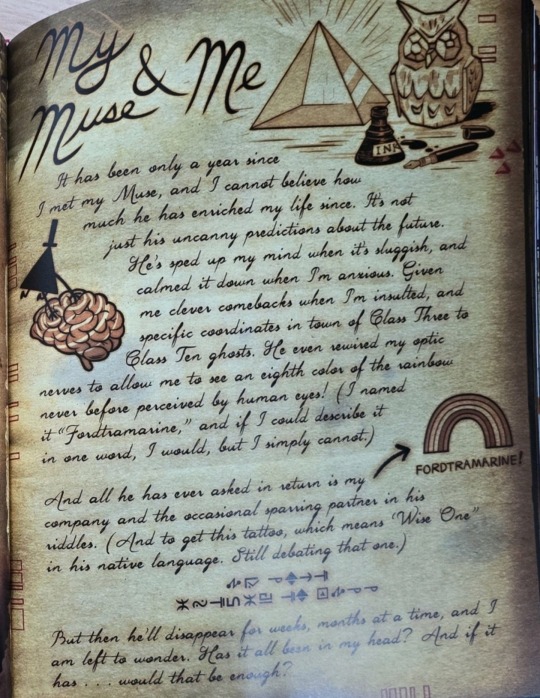
hence, religious servility, and this is it, in its purest form, begins to intertwine with Ford's own emotions, as well as fill a huge hole in his life in the form of the appearance of a friend. reverence begins to mix with respect and the desire to just be friends.
after all, Cipher's flattery is aimed not only at Ford's ambitions - it concerns all his insecurities and questionable life choices. where he speaks almost directly about how Ford is always right, and everyone else is either stupid or envious of Pines and his boundless special mind. Also, these empty compliments are aimed at Ford's main fear - being rejected by society or anyone at all. Bill promises him not power, not money, but his faces on all scientific journals - that is, fame.
the exchange of mutual jokes and thoughts leads to the emergence of friendship from Ford's point of view. he gets used to Bill's extraordinary statements and finds them native in his own way, some unusual feature of his communication style. Stanford is unusual himself, so he is happy to meet not only manifestations of paranormal activity but also sometimes creepy statements by Cipher, finding them exciting, making Bill's recruitment work even easier.
Bill helps Ford with anxiety, constantly advises something, even improved his eyesight - all these countless gifts began to change Bill's title in Ford's head from a friend to a best friend who was with him not only for the sake of transferring some kind of supreme knowledge - but also just like that, in seemingly mortal matters and problems. he was even ready to get a tattoo on himself at the request of his muse, but at the last moment, nevertheless, refused.
it should be understood that Stanford, due to limited experience of communication and socialization, had no idea what was normal and what was abnormal. Now and beyond, Cipher's demands will begin to grow in their seriousness, and Ford will really stop asking questions about them. maybe he justified it by saying that this is what friendship between beings of different kinds looks like, maybe a slight infatuation mixed with adoration with pink glasses closed any logical conclusions.
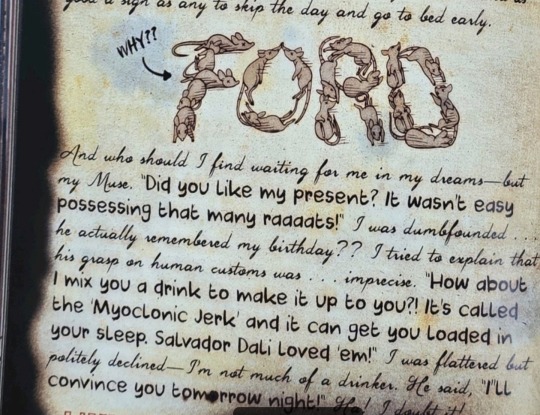
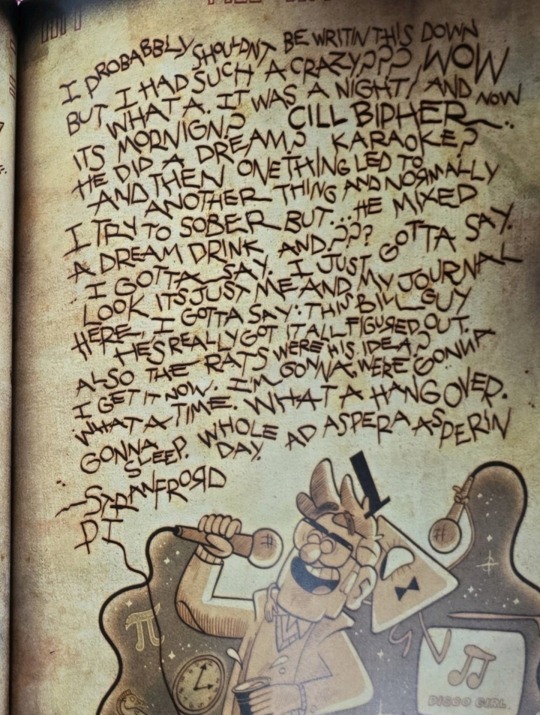
Ford's birthday is an indicator of a complete departure from Bill's perception of a divine being. Ford received a rather dubious gift in the form of dead rats laid out in his name, but it didn't matter at all to him - the main thing was that his birthday was remembered. the attention paid to the lonely Ford completely killed any rational thinking, so at the moment of drunken singing within the boundaries of reason with his muse, he was happy. He found someone who understood him, worked side by side with him, and was just there for him.
maybe there would not have been this blind infatuation of any character, Ford would have asked more questions about such strange and very disturbing signs of attention, like a tattoo or dead animals, but the emotional nature that he so desperately hid from himself won out again.
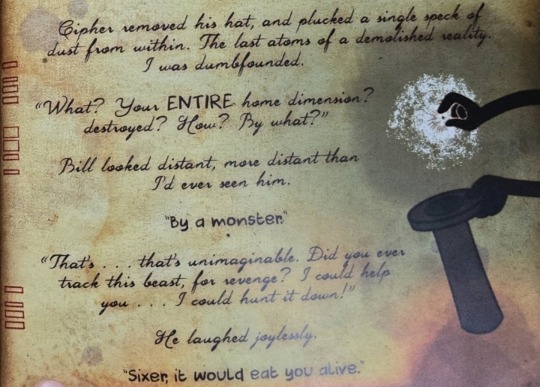
the moment Bill listened to him about Stanley, told him, and showed him the last atoms of his destroyed dimension, was the peak of their relationship. the very intimacy of such a conversation, its irreplaceability, when Ford saw not his exalted muse - he saw another being who had lost his home. he is ready to help at the same moment because he cares, and he will do everything to help with the pain, not knowing the whole truth.
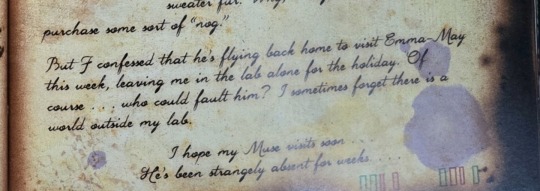
later, on the pages about Krampus, Ford puts Bill on the level of Fiddleford's wife and asks in his diary when his muse will appear when his assistant left him. Ford does this unconsciously, which only confirms a young and even innocent love, which Pines himself does not notice out of inexperience.

and that's why he gets angry when Bill doesn't show up to fight the monster on his conversion. he bitterly thinks that Bill inspires another scientist, that is, he is jealous, and that maybe they are absolutely not partners at all, that is, he is afraid of losing Cipher. all these thoughts are recorded in the diary as a single whirlwind of emotions, which again confirms this indifference to Bill.
and when Bill pointed out to Ford his inattention, he immediately wilted, came to his senses, and was ashamed. he really regarded Bill's words as the truth. sometimes returning again to the near-religious servility that had gone away, but in tense moments made itself reappear.

let's end this chapter with a page from the website about the axolotl, which Ford was forced to release at the request of Cipher. Because of Bill's clever mockery of leaving Ford for another scientist, he, in a panic, agrees to everything. he just seems to point out their difference in positions in the relationship a little sadly, no matter what - because Bill always knows better than Ford, and it's better not to argue once again.
In conclusion, we can briefly summarize that Ford went from religious anxious adoration to friendly relaxation and again to loving blind anxiety.
stay tuned for the next chapter about Bill's perspective on this period of time!
#gravityfalls#billford#stanford pines#gravity falls#bill cipher#the book of bill#ford pines#gravity falls analysis
118 notes
·
View notes